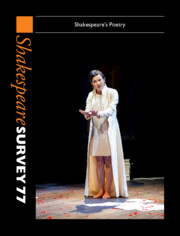Book contents
- Shakespeare Survey
- Shakespeare Survey
- Shakespeare Survey
- Copyright page
- Editor’s Note
- Contributors
- Contents
- Illustrations
- Remembering shakespeare’s Sonnets in Lucy Negro, Redux
- The Poetics of Antiquarian Accumulation in a Lover’s Complaint
- Different Samenesses
- Shakespeare’s Canvas
- ‘Persuasion by Similitude’: Finding Likeness in Shakespeare’s a Lover’s Complaint
- ‘Nothing-to-be-glossed-here’: Race in Shakespeare’s Sonnets
- Allegorical Desire, or, the Sufi ‘Phoenix and the Turtle’
- The Poetics of Shakespearian Erasure: Lyric Thinking with Bhanu Kapil and Preti Taneja
- Lucrece, Letters and the Moment of Lipsius
- Shakespeare’s Arabic Sonnets
- How to make a Formal Complaint: Sara Ahmed’s Complaint! and William Shakespeare’s a Lover’s Complaint
- They also Serve who only Stand and Write, or, how Milton Read Shakespeare’s Sonnets
- Writing Delight with Beauty’s Pen: Restoring Richard Barnfield’s Lost Credit
- Ocular Power and Female Fascinum in Shakespeare’s Venus And Adonis
- Pretty Creatures: A Lover’s Complaint, the Rape of Lucrece and Early Modern Women’s Complaint Poetry
- Lyric Voices and Cultural Encounters Across Time and Space: The Poetry of William Shakespeare and Faiz Ahmed Faiz (1911–1984)
- The thing itself or the image of that Horror: Fictions, Fascisms and We that are young
- Shakespeare’s Refugees
- Shakespeare as a Source of Dramaturgical Reconstruction
- Shakespeare, Race, Postcoloniality: The State of the Fields
- Asian Shakespeares online from Singapore
- Strange Shadows: Translating Shakespeare – The State of the Field
- Gender and Sexuality: The State of the Fields
- Shakespeare Performances in England, 2022–2023
- Productions Outside London, 2022–2023
- Professional Shakespeare Productions in the UK, January–December 2022
- The Year’s Contribution to Shakespeare Studies
- Abstracts of Articles in Shakespeare Survey 77
- Index
Productions Outside London, 2022–2023
Published online by Cambridge University Press: 07 November 2024
- Shakespeare Survey
- Shakespeare Survey
- Shakespeare Survey
- Copyright page
- Editor’s Note
- Contributors
- Contents
- Illustrations
- Remembering shakespeare’s Sonnets in Lucy Negro, Redux
- The Poetics of Antiquarian Accumulation in a Lover’s Complaint
- Different Samenesses
- Shakespeare’s Canvas
- ‘Persuasion by Similitude’: Finding Likeness in Shakespeare’s a Lover’s Complaint
- ‘Nothing-to-be-glossed-here’: Race in Shakespeare’s Sonnets
- Allegorical Desire, or, the Sufi ‘Phoenix and the Turtle’
- The Poetics of Shakespearian Erasure: Lyric Thinking with Bhanu Kapil and Preti Taneja
- Lucrece, Letters and the Moment of Lipsius
- Shakespeare’s Arabic Sonnets
- How to make a Formal Complaint: Sara Ahmed’s Complaint! and William Shakespeare’s a Lover’s Complaint
- They also Serve who only Stand and Write, or, how Milton Read Shakespeare’s Sonnets
- Writing Delight with Beauty’s Pen: Restoring Richard Barnfield’s Lost Credit
- Ocular Power and Female Fascinum in Shakespeare’s Venus And Adonis
- Pretty Creatures: A Lover’s Complaint, the Rape of Lucrece and Early Modern Women’s Complaint Poetry
- Lyric Voices and Cultural Encounters Across Time and Space: The Poetry of William Shakespeare and Faiz Ahmed Faiz (1911–1984)
- The thing itself or the image of that Horror: Fictions, Fascisms and We that are young
- Shakespeare’s Refugees
- Shakespeare as a Source of Dramaturgical Reconstruction
- Shakespeare, Race, Postcoloniality: The State of the Fields
- Asian Shakespeares online from Singapore
- Strange Shadows: Translating Shakespeare – The State of the Field
- Gender and Sexuality: The State of the Fields
- Shakespeare Performances in England, 2022–2023
- Productions Outside London, 2022–2023
- Professional Shakespeare Productions in the UK, January–December 2022
- The Year’s Contribution to Shakespeare Studies
- Abstracts of Articles in Shakespeare Survey 77
- Index
Summary
COVID-19 seemed like a distant memory as theatres re-opened in 2022; faces went unmasked, and houses seemed fairly full as I began travelling the country for performances of Shakespeare. Perhaps surprisingly, few performances focused on or even contained traces of the pandemic. Instead, other pressing social concerns came to the fore, including the climate emergency, intergenerational conflict – recalling the supposed disparities between Boomers, Gen X, Millennials and Gen Z – as well as questions of representation and identity, especially regional and national identity. I saw plays in pairs in the hope that productive comparisons would ensue, and common themes did emerge. The two Midsummer Night’s Dreams were focused on issues of language and translation, while the two Hamlets shared a concern with child and adult dynamics. Both Tempests interrogated issues of ecology and climate change, while the Macbeths foregrounded the contemporary through their aesthetics and appeal to new audiences.
- Type
- Chapter
- Information
- Shakespeare Survey 77Shakespeare's Poetry, pp. 292 - 311Publisher: Cambridge University PressPrint publication year: 2024

